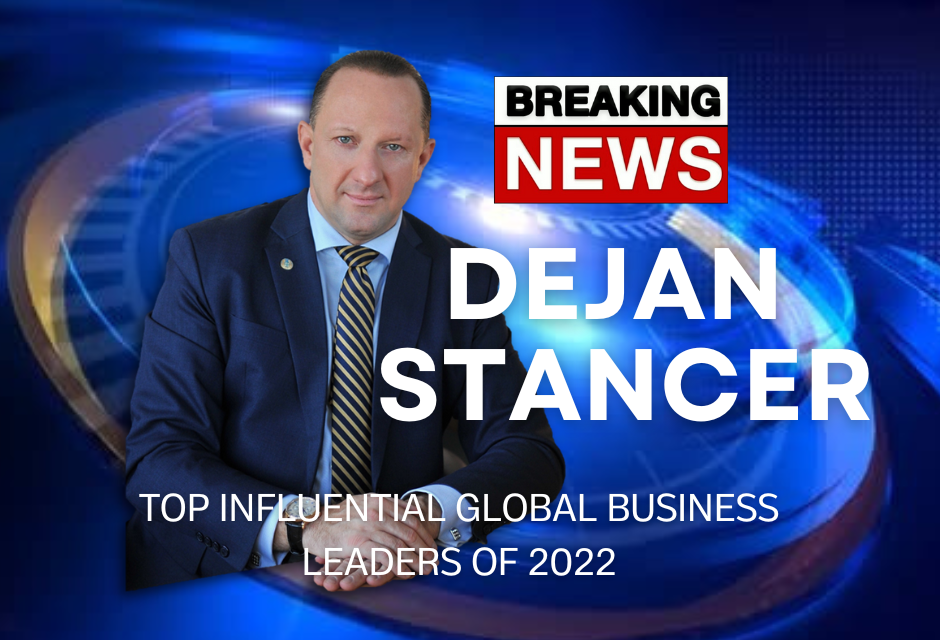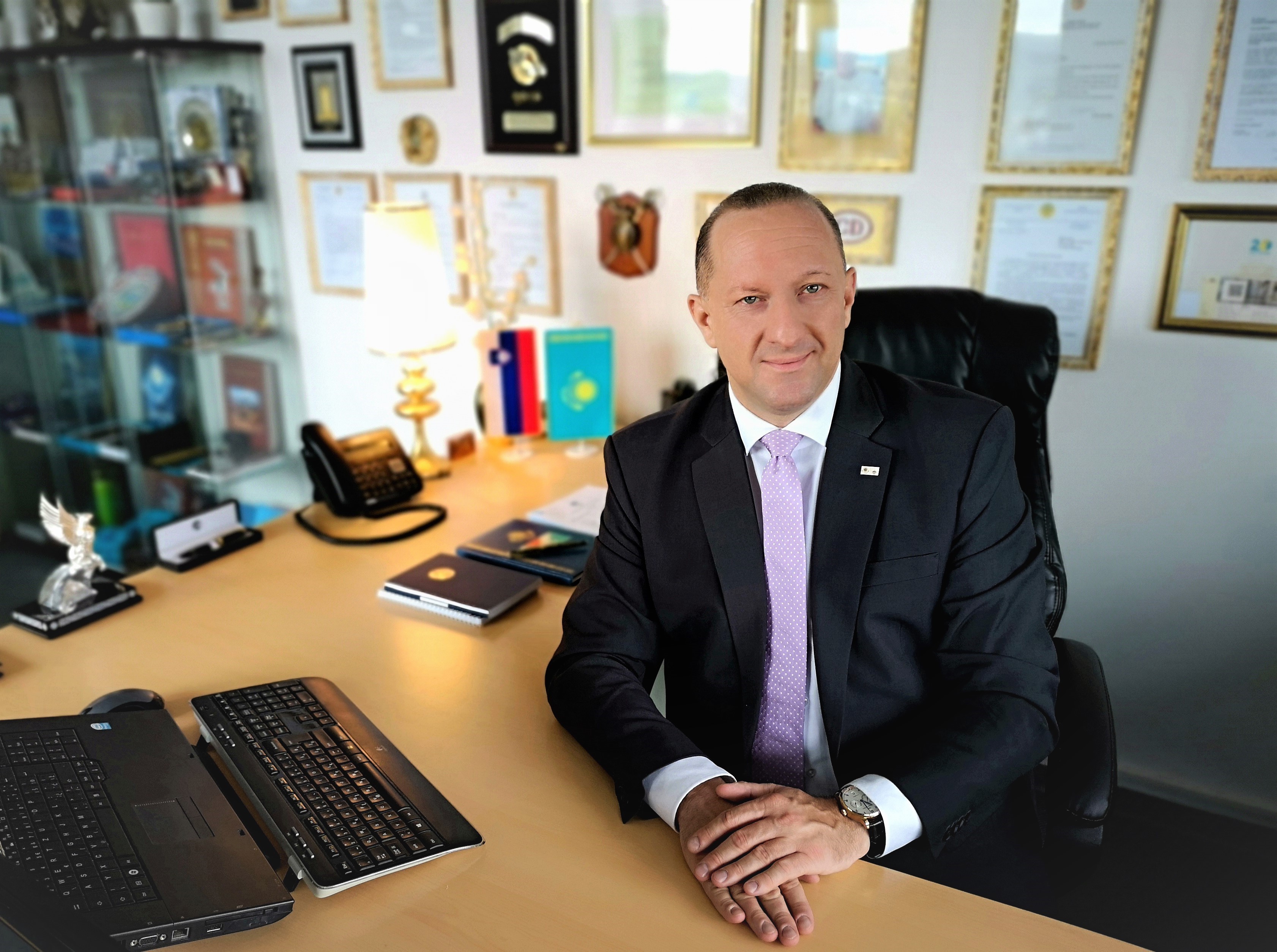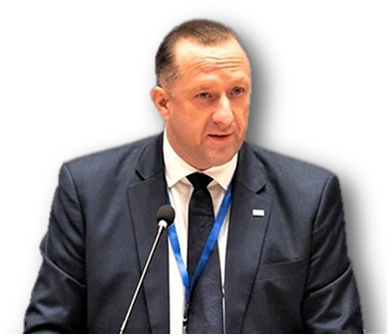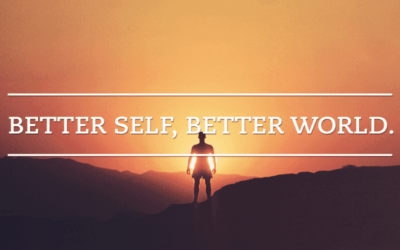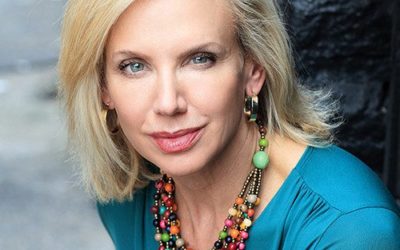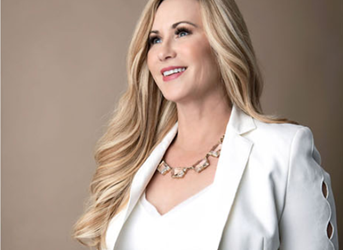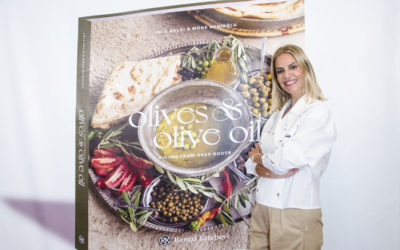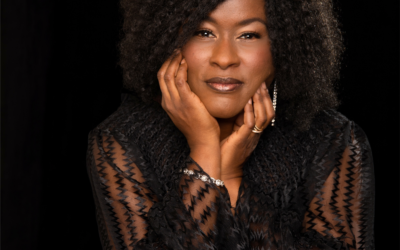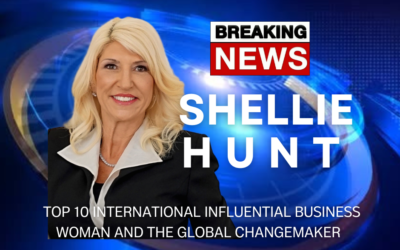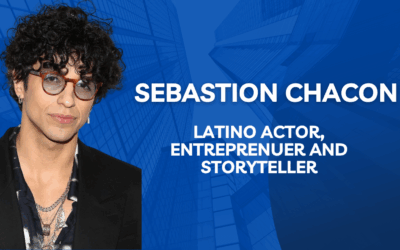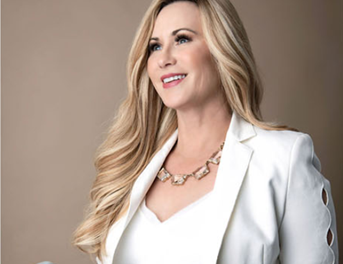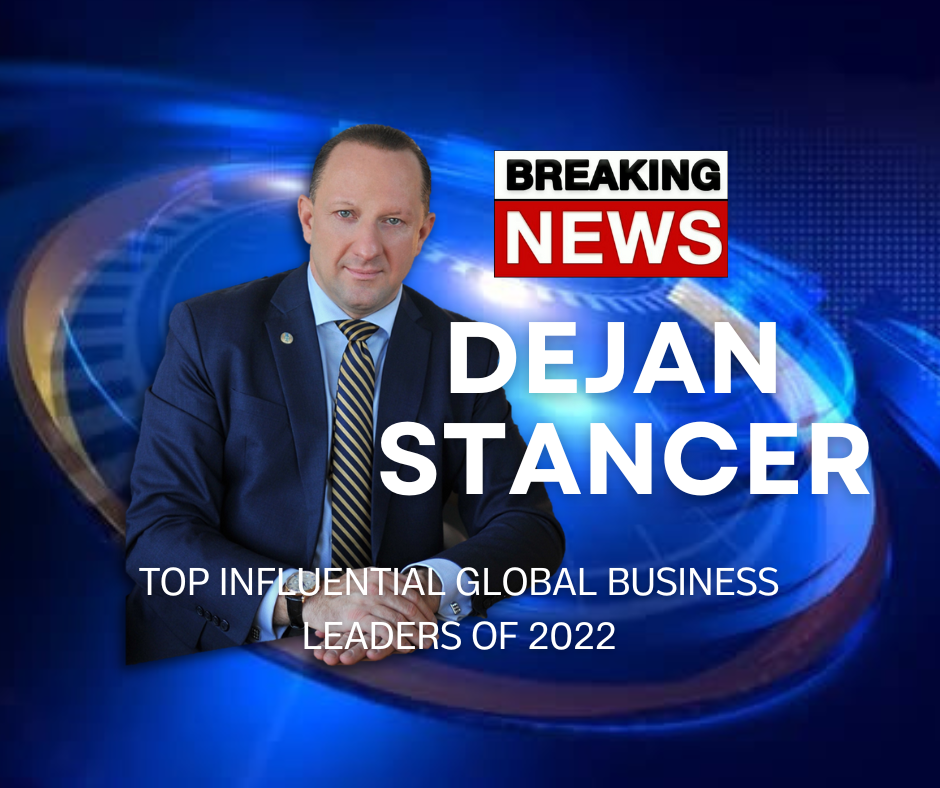
Exclusive Interview with one of the Top Influential Global Business Leader of 2022
Having excellent leadership qualities such as knowledge, vision, experience, and strength is imperative to being a leader. The experiences you overcome help you gain strength and overcome adversity, this is not something people are born with but is a product of growth. In order to be a global leader, you have to have an exceptional intellectual mind to make various decisions, prioritize human solidarity, find solutions, and continue to bridge gaps that exist in various forms.
Dejan Štancer is a Global Leader for the Global Chamber of Business Leaders (GCBL). Dejan has stood tall in the face of adversity, he believed, dreamed, and lunged forward into his vision to make a global change. When you meet this global leader that was born in Slovenia, you will notice his inspiring nonsense direct approach towards business and sustainability.
IPM: Can you tell us a little about yourself and how you got to where you are today?
Dejan: I started our entrepreneurial path very early when I was barely 20 years old. At that time, for the most part, it was more important to be a diligent student so that you would get a well-paid job after graduation. Not for me. Even then, I decided to live my life by creating a “job” for myself, and so I live most of my life. I was too young to acquire theoretical knowledge at the time, and for academic knowledge, so I had to learn most about entrepreneurship. For the most part, the mistakes were probably not a few. Especially if I look back from today’s perspective. But unimportant, it is important that I persevered on my path, tried even though it was sometimes desperately hard, and that I believed in myself and every new day. Later, I opened quite a few companies that were so very different from each other, but it was this plurality and multidisciplinary that educated me in such
different things and gave me the knowledge and skills that brought me to where I am today. Let me just mention that before I was appointed CEO of the Global Chamber of Business Leaders (GCBL), I ran one of the largest business clubs in Central Europe and has been licensed for international lobbying and consulting for more than a decade. This is one of the reasons why, and above all, due to my rich life experience, I also advise some of the highest political representatives, including the presidents of the countries.
IPM: Can you expand upon your roles as Chairman of GCBL?
Dejan: As the Chairman of the GCBL Board, I lead and direct the processes and projects that lead to the further growth of the organization, because only in this way, with an expansive and progressive leadership policy, can we achieve the set goals, which include that in this Decade of Action, business leaders governmental officials and entrepreneurs from around the globe must come together in this global marketplace to share knowledge, facilitate business collaboration and opportunity, and work together to be a part of the global solution in this new, disruptive business environment. Recognizing that innovative business models and best practices must unite with strategies of sustainability. It is our global mandate to govern, develop policy, and grow our businesses in a manner that makes a positive impact on the environment, society, and our global economy.
IPM: What is your long-term goal for GCBL?
Dejan: In the long turn, we strive to make GCBL a central global organization that unites and represents the voice of global business leaders at its core. We are aware that more and more people have enough of a world ruled by greed. Enough of selfishness, wars, and hatred…
I believe people will soon realize that the world is heading into disaster. Life is becoming extremely expensive, fossil fuel prices are skyrocketing, the middle class is disappearing, and there is more poverty, with serious reform processes concerning climate change, sustainable development, and ethical doing business, we have not even seriously started yet.
Based on the basic idea of the Global Chamber of Business Leaders, the latter must become the core of unification, not only necessarily like-minded, but all government leaders, CEOs and executives, entrepreneurs, investors, and business and industry leaders who share a shared vision: sustainable well-being and growth of business in a disruptive and ever-evolving global economy, for the sustainable development of the world, for a departure from hatred and war, for solidarity, respect for diversity, global cooperation and development, and last but not least for ethics, and ethical doing business.
IPM: Can you delve into GCBL’s plans for climate change awareness?
Dejan: Awareness of climate change is, unfortunately, something that many still do not understand and behave as if they live on another planet, or we have planet B at our disposal. Unfortunately, I am thinking of political decision-makers, and that is worrying. But no matter what, GCBL is going its own way here. We know that the time for action is now and that measures for environmental transformation need to be implemented in a truly thoughtful way and with a strong focus on the future. In any case, we are also aware that we must also have before our eyes the pitfalls into which the path of change can lead us if we rush in a non-strategic and reckless way.
GCBL already works with climatologists and other experts from various academic fields in this field, and last but not least, we focus on climate change when working with young people involved in the YBLP – Young Business Leaders Program of the Global Chamber of Business Leaders.
IPM: With inflation rising to an all-time high, do you believe a recession is doomed to come?
Dejan: By nature, I am not exactly a pessimist, but rather a moderate optimist, but I am not very optimistic about the future global recession. I have a feeling that the system we live in is collapsing under our feet. Why do I think so? We used to be taught economic theories according to which crises are supposed to happen cyclically, for a decade, but now this cycle is getting shorter. All the time we are on the brink of some crisis from which we are almost into a new crisis, and the result is the immense wealth of a handful of almost privileged people who only get rich with crises, and at the same time a smaller middle class. Crises only change their names and bases, once there is a health crisis, another time there is a war, then something new, but there is more and more devastation, discord, and finally more and more poor people who did not have much to do with the crisis. lost that too.
IPM: Do you believe any fiscal, investment, monetary government policies should be put in place if another recession hits?
Dejan: I am neither a macroeconomist nor a fiscal expert, so I cannot give a general recipe. However, I think that the new crisis, as well as all subsequent crises, will have different effects on national economies and social policies. The strategy of a country’s fiscal, investment and monetary policy will therefore depend on several factors, including the condition of each country, as well as the resources available to it. But I think, and experience teaches me, that people find it easier to cope with crises in environments where countries are more socially oriented. The latter also means that the consequences of the crisis are easier to manage, and at the same time part of the burden of employers is borne by the state. This makes it easier for employers to deal with the consolidation of the company, new markets, new customers, in short, everything that can mean a new start-up cycle of the company.
In short, in my opinion, the question is no longer whether there will be a crisis or not, the only question is when the crisis will be, and what dimensions it will have.
Everyone has their own opinion with the wars that are going around the world currently, can you share your opinion on the war in Russia and Ukraine since you are closer to the news source?
We had the Cold War once, in which not much happened, then we got cyber wars, which did and still change the course of history and partly brought new faces to the scene, continues with ‘proxi wars’ in which everyone participates, an attack that no one seems to be involved in, and the question is what’s next, and how far we’re going to go. Are we really willing to look at the suffering faces, dead and mutilated children, and act as if the guilt of all this happening is not ours either? And if the future continues to be in proxy wars, will we not one day be a playground of conflict and suffering for ourselves too? Slowly, it will be necessary to listen to young people who do not want wars, hatred, and suffering, but cooperation for the common good, connection, sharing for a different, better world.
In this seemingly senseless war, most people are probably wondering why all the casualties, suffering, destruction, and the answer are impossible to find. Impossible if you think with your heart, otherwise you will quickly find out what is behind this conflict. It is already clear that there will be no winner of this war, but there will be many losers left, and some extremely rich people.
And make no mistake, we at GCBL oppose all wars, including those in Iraq, Syria, Ethiopia, Libya, or Yemen. War is war, lives are lives. I don’t know if we all know, but to this day The United Nations lists around 40 ongoing wars and conflicts with over 100 combat deaths. And this in the 21st century, in the age of digitalization and progress …
IPM: Can you share any experiences that this current war has impacted you with?
Dejan: Personally, I can say that I was very affected by the war in Ukraine. Partly because I did not listen to those who predicted war aggression. I believed in common sense, common sense, and above all, that two nations, so strongly connected by history, culture, even religion, really can’t fight. I know, very naive. Especially since I still vividly remember the war in the former Yugoslavia, which was very similar to today’s war in Ukraine, with some differences, of course. One of the differences was that then the media was not what it is today, and war could not ‘happen in our living rooms’ when this is the case today. We watch all the brutality almost live on mobile devices. Another special feature is that at that time it was a war between two nations that had their own ‘sponsors’, but they did not get involved in the war. Here the war in Ukraine is completely different. It is a conflict of the future, a geopolitical expansion of influence, and a conflict of concepts that has not been tolerated for almost 30 years. We must not close our eyes to the fact that the war in Ukraine is a war only between aggressor Russia and Ukraine, which is the victim. There is much more to it, so inputs into this conflict are also appropriate. Let’s not forget that this war costs millions of dollars every day. Russia will slowly have nowhere to take them, and Ukraine has never had them, so how can the war last for the third month already?
Otherwise, yes, we also had a few people in GCBL in Ukraine when the conflict started. After the initial shock, we had to make an urgent assessment of the situation and determine that we need to get our people out of the country. With the help of good people and great contacts, we also succeeded. Furthermore, we managed to save even a few students from Africa who found themselves in a desperate situation and between two fires.
IPM: What’s your opinion on geopolitics and the effects it has on the world such as supply chain costs, oil costs, and the impact it has on politics and international affairs?
Dejan: Spreading geopolitical influence is a legitimate and legal act as long as it does not cause conflicts and wars. Financial slavery also causes a lot of suffering around the world, but there is a big and fundamental difference between whether a man has lost property or lost his children and suffered such terrible things that no one will be able to forget them. Unfortunately, we take peace for granted too much, but that has changed some time ago. I also find it very difficult to accept predictions of a new world order, especially if they come from one of the world’s most influential politicians, and especially if this happens in the middle of a war with the world’s largest nuclear power.
The world has become as global as we have wanted and aspired to over the decades. Any major excess causes supply chain disruptions, skyrockets prices, and the latter leads to inflation, which is a generator of poverty. I believe that no one wants to live in a world of poor people, because such a world will also become very dangerous.
That is why we urgently need to work to resolve the outstanding issues at the negotiating table, even before conflicts arise. The global economy needs development, collaboration, networking, and it urgently needs organizations like GCBL that make it all possible and focus solely on solutions for a better future for all.
IPM: Do you believe the government should partake in redistribution of wealth? How should the government redistribute wealth and income?
Dejan: If I answer this question literally, surely someone will label me a socialist. In any case, it is clear that the growing poverty of the world’s population is not taking things in the right direction and that we will have to start looking for fairer solutions. I will never agree with the thesis of encroaching on private property, but at the same time I have a hard time digesting the praise of many governments for economic growth and GDP, most of which people do not have much, or even nothing. What good is a rich country to you if young people at the peak of their working capacity are forced to live on the streets? The greed of individuals and political lust should not be an obstacle to the solutions that need to be found so that future generations can continue and surpass the work we have invested in building a modern world.
IPM: With globalization growing exponentially, can you delve into your perspective on it?
Dejan: I have said a lot about globalization in the past. Of course, we also need to draw the line between globalization, as forced by certain centers of power, which was especially evident during the current pandemic. I personally distance myself completely from globalization, which leads to the ultimate power of only a handful over the world. I do not support the growing power of multinationals, and their chaining, which ultimately leads to modern-day slavery. I do not support a system that squeezes out the “little people”, while the big ones are allowed everything and more, nor do they have to pay taxes. The direction is completely wrong and leads to complete control of people, to slavery, and even earlier to conflicts, wars, chaos and suffering … Globalization, as I advocate it, is the ultimate cooperation, no matter what, on race, religion, worldview, nor on citizenship or region of origin. People need to connect; we need to become part of a global community where we see only one and only goal – prosperity for all. Together, we need to address issues that divide us, seek answers to pressing social issues, support technological progress and science, and, above all, be aware that there is no people because of politics, but politics because of the will of the people. When it comes to laws, it is fair that we all become equal once and for all. We need to address serious global issues such as the environment, climate change, sustainability, the energy of the future, while pursuing the goals set out in the UN 2030 agenda, in particular the eradication of poverty. These should become the main topics and not wars and complete control over the people.
IPM: Do you think that the consolidation of multinational companies caused by globalization will influence Small Medium Enterprises?
Dejan: Globalization as it was started does not mean consolidation, but it means the clear destruction of a whole range of small and medium-sized enterprises in order to have complete control of the market by the then multinational companies. Let us not close our eyes, let us acknowledge that the world is beautiful if it is different, if we are different, if we can cooperate and connect with the goals of common success. Would anyone really want to live in a world where there is only one brand of stores? I purposely said “then multinational companies” as it is still a long way to go. Especially now that it is becoming clear that no major reset of society is possible, that people want to work, create, in short be people. In this spirit, there is a need to further promote economic growth, which must be based on small and medium-sized enterprises, which will become part of a globally integrated economy. For the further social development we want, it is essential to maintain and even strengthen the position of small and medium-sized enterprises.
IPM: With tensions growing between the superpowers, do you feel globalization will be affected?
Dejan: If we see globalization as a set of changes in society, politics, and the economic system resulting from increased trade and cultural exchanges at the global level, to liberalization and free trade, then globalization now seems more questionable, since World War II. Tensions between the superpowers, which seem to be growing and posing an increasing threat to world peace, are certainly something we must face and must not come to terms with. Now is the time to somehow limit the growing nationalism that people all too often confuse with patriotism. Let’s look at what is currently happening in Ukraine. As someone who has been monitoring the situation for a long time, I fully understand what is going on there, in part I even understand the frustration of the Russian president, but good wars do not exist, just as there is no bad peace. Any aggression must be condemned immediately and immediately while forcing the parties to end their suffering. Nowhere in the world should people forget what war is and what misery it brings. In order to be able to at least partially understand the background of current events, we need to understand the time and space in which we live. Gone are the days when we had one superpower in the world that controlled everything from technological development, financial markets, military development, and more. In this context, it is necessary today to understand the time when at least two other superpowers “matured”. Most of the shocking events we face today that arouse discomfort and fear in us have their own background, and it has actors, not least always “profiteers”. We should not be surprised if the future is permeated by conflicts, nationalism, hate speech, but at the same time, there will be trade and other economic cooperation, in short, everything that brings profit and enables development. As long as globalization means power and concentration of power, I am not afraid of the end of globalization. I am more concerned about global peace, but I am also a moderate pessimist here. More likely than the Great World War is the likelihood of constant but moderate and intense conflicts aimed at strengthening the power of superpowers. We are talking about “Proxy wars”, which are already happening and will be even more frequent in the future, and in which a large number of countries will participate, covertly, and their special feature is that they never take place on the territory of superpowers. But you know, the suffering that local war brings is the same as the suffering of world war. War is war, and no war means anything good for the civilian population.
IPM: What do you think of the path the world is headed to currently? Do you think it’s time for major change?
Dejan: The world has changed on its own. If you look around, you will actually see how much the world has changed since the moment they began to take away people’s freedom and encroach on human rights, all that apparently in the name of health.
We used to be divided into left and right, socialists and capitalists, but now the “little people” seem to live in a kind of turbo capitalism, where they are pushed to the brink of subsistence, while the “big” live, the rich, and strong in deep socialism. Instead of them contributing part of their profits, states give them tax rebates. Some burn to death and from morning to dawn, and have virtually nothing from life, so that those for whom they burn have the opportunity to spend billions on their “toys” or take photos in space. I fear the pandemic has changed the world forever. I’m afraid this is just the beginning of something, maybe even the end. We’ll see. However, I want us to change the world. Back there, when we believed in man, in solidarity, ethics, and when our children were the future, not profit and money. Most social problems today are probably based on greed. The generation before us was the one that prepared the ground for this, ours, my generation is the one that is the generator of greed, but if I look at the next generation today, it seems to me that the solution lies in them. This is one of the reasons why the Global Chamber of Business Leaders strongly supports the initiatives of young people, future leaders.
IPM: GCBL is across the world, including beautiful Africa, can you delve on your role there and “The Hub of Medicines”?
Dejan: I always say that Africa is the continent of the future and I think it is possible to see more and more every day that I am not mistaken. Some countries are developing faster and more than one might even wish. The GCBL has therefore taken a decision at the highest level and last year formally, and for the first time in history, appointed the GCBL Director for Africa. The GCBL headquarters for Africa will soon be officially launched in Harare, the capital of Zimbabwe. And just mentioning this extremely interesting country with a stunning history, Zimbabwe was chosen after careful consideration, especially because of the potential we see in this Southern African country in many areas such as tourism, pharmacy and medicine, and especially agriculture and farming.
Global Chamber of Business Leaders is becoming an important factor in the development of the African continent. We want to bring the world to Africa as much as possible and we want to bring Africa into the world as much as possible. After the outbreak of the pandemic in 2020, and after the start of the vaccination program against this coronavirus, we could see all the selfishness and arrogance of Western world leaders towards Africa. First, there was a debate on the transfer of patents for vaccines, which we also strongly supported in the GCBL, and when it already seemed that progress could be made, there was a turnaround and greed won. Again. To this, of course, let me add that we are talking about the beginning of 2021, at a time of the alpha strain of the virus, when vaccines seemed to be the only and effective weapon against the virus. Not long after the world turned its back on Africa for greed and profit, and as world leaders rushed to compete over who would promise more vaccines for Africa, new strains began to emerge and the vaccine appeared to be an increasingly ineffective solution. . Shortly afterwards, there was a report of a new anti-coronavirus drug that could be effective not only for covid-19 but also for other zoonosis (zoonotic disease or zoonoses -plural), an infectious disease that is transmitted between species from animals to humans. At GCBL, we immediately contacted one of the drug manufacturers and reached a cooperation agreement, and Africa received a solution in a drug that will be available anywhere on the African continent via the Hub for Africa, located in Harare. And most importantly, the price of the drug is only a few percent of the price of the same drug in the West. I am extremely proud of this achievement, as proud Africans can be of all those who have provided them with a safe and effective solution not only for the covid-19 virus, but also for many other viruses plaguing the continent.
IPM: Can you share the importance of some of the personal relationships you have grown with some African Presidents due to your role with GCBL?
Dejan: It is true that I have many friends in Africa, but I assume that you are applying to Emmerson Mnangagwa, the President of Zimbabwe. President Mnangagwa is an outstanding politician and a great man. How great of a politician he is can only be seen when we look at the legacy he inherited from the former president. I have in mind the sanctions of the West, which were imposed during the time of the previous president. Whether or not sanctions are justified then is a question to which I cannot give an unequivocal answer, but these sanctions are certainly completely unnecessary and unproductive today when the country is successfully run by a new president and a completely new government with a completely different agenda and philosophy. After all, the only thing that politics should strive for today is economic and political cooperation between countries, investment, development of science and technology, fostering friendship, promoting good relations between people. In view of the above, I really do not understand sanctions against Zimbabwe today, as the country, despite the sanctions, is developing well, is not involved in any conflicts, and is completely open to foreign direct investment. I hope that common sense will prevail and that these unnecessary sanctions will soon be just a memory of the past.
IPM: Can you share more about how GCBL is a philanthropic organization?
Dejan: Of course, GBCL is a philanthropic organization, and I am extremely proud of that. As an organization, we are fundamentally committed to values such as solidarity and helping the weak, which we prove by our actions every day. We also point out that our executives should always remind members and partners, not only of making profits and enrichment at any cost, but that people are the greatest wealth and that investing in people is the best investment. As well as that our workers are the best and most creative if they are happy. Unfortunately, in today’s world, many people are not happy about this advice, which can be seen in everyday life. My wish is for everyone to become more philanthropists. The pandemic has taken people very far away and this will be one of the first things we will have to address after the end of the pandemic. People need to be reconnected, not just virtually, but emotionally. The ultimate progress will only be possible through cooperation and only if we are aware that there are always people around us who need our help. “Homo homini lupus” should be forgotten and let the awareness prevail that robots yes, but they will still not be able to give us emotions.
IPM: Do you have a message you would like to share with our readers?
Dejan: Based on myself and my past, I can only advise people to have immense perseverance. Live with your head open, think, detect problems and at the same time look for solutions. Listen to what the people around you have to say, don’t forget to listen to your intuition and, most importantly, your heart. Remember that only you dream your dreams, so people around you may not understand them. If you persevere, your dreams may even come true. So again, never stop dreaming, hoping, and persevering.


Related Articles
Influential People to know
Influential People News was created to celebrate influential people who have emerged from various places around the world, these are the people who have stood up in the face of all adversity and affected positive change to achieve personal and professional...
Influential People News
Welcome to Influential People NewsGet the latest news from Influentialpeoplenews.com, from the most influential celebrities, authors, artists, entertainers, fashionistas, models, coaches, doctors, health & wellness practitioners, and much more to breaking news,...
Interview with a Top Influential Legacy Builder
by Influential People Magazine Over the past century, technology has changed a lot regarding media. The transition from old media to new media has gone from the “old” previous generations using radio, newspapers, and television to the age of “new” media by expanding...
EXCLUSIVE INTERVIEW WITH THE TOP 1O MOST INFLUENTIAL BRANDING & MEDIA EXPERT LORI A MCNEIL
Exclusive Interview with the TOP 10 Most Influential Branding & Media Experts LORI A MCNEIL Lori McNeil is a 20-year International Educator & Business Coach who gets results. She helps entrepreneurs worldwide reach higher levels of success in life...
How to Prepare for an Ironman Triathlon
An Ironman triathlon is one of the most grueling tests a person can put their body through. It consists of a 2.4-mile swim, a 112-mile bike ride, and a 26.2-mile run. It’s no surprise that completing an Ironman is a huge accomplishment, as it requires immense physical...
HOW TO AWAKEN YOUR BETTER SELF
Copyrighted by Christopher Salem We are already one month into the New Year. It is during this month we should take time for contemplation. The questions to be asked of yourself are as follows: Where were you? Where are you now? Where do you like to be? All...
9 Characteristics Of Irresistible People
Copyrighted by Susie Moore “Julia has a certain magic, doesn’t she?” I heard a coworker say over margaritas a few years ago. Julia’s side hustle as a writer had recently taken off, she was in a loving relationship, all the managers adored her (her next...
3 Reasons You Need to Sell More During A Recession: 3 Strategies You Need To Make Selling Easy In The Face of Adversity
I am a big believer that an economic slowdown is the time to keep your foot on the gas, not take it off. So often, sales teams and professionals tend to get tentative and even pull back on their calling efforts when the marketplace gets challenging. And I get it;...
Are Your Contributions Known By Your Clients?
Copyrighted by Burke Franklin There is a story of an employee complaining to Henry Ford about the “guy down the hall with his feet up on the desk…”. The employee asked Henry Ford, “Why do you pay him so much? He doesn’t do anything!” To which Henry Ford responded,...
How to Socialize Without Alcohol & Enjoy It: 3 Tips to Help You to Stand Up for Yourself
Interviewed By: Gitte Randrup According to the National Household Survey, three out of four teenagers in high school have tried to drink alcohol. Another survey, from the National Center on Addiction and Substance Abuse (CASA) of Columbia University,...
RANKING CARBS BY HOW HEALTHY THEY ARE
Copyrighted by Dr. David Friedman Carbohydrates are a macronutrient that the body uses as a primary source of energy. While many weight loss diets have people believing that CARB is a four-letter word, that’s actually far from the truth. There are certain carbs that...
3 Empowered Mindset Shifts To Change Your Life
by Melissa Hull Feeling stuck in your own patterns? Break the cycle with these empowered mindset shifts that can change your life. We are all one thought from changing the rest of our lives. One thought. One choice. One action. That’s all it takes. But that doesn’t...
Exclusive Interview with Emerging Influential Leader Cleopatra Fitzgerald
Exclusive Interview with New Emerging Influential Leader Cleopatra Fitzgerald Cleopatra Fitzgerald is a Manhattanite born on February 16th, 1984. She graduated with honors from The City College of New York from Political Science and attended Hunter College....
Chef Jale Balci Celebrates Launch of New Book “Riches from Deep Roots: Olives & Olive Oil” at Los Angeles Event
Turkish celebrity chef and entrepreneur Jale Balcı has revealed the secrets of the magical olive with the launch of her new book Riches From Deep Roots: Olives & Olive Oil at an exclusive event held at the residence of the Consul General of Turkey in Los Angeles...
3 Tips To Rise From Creativity to Cashflow
By Krystelle Richardson Today I woke up with the words on my lips of "Keep RISING". As we go throughout our day and life, we come across people who have capabilities. Some have realized how to use those capabilities to further their life and the lives of others. We...
Krystylle Richardson has been named A Top 10 Influential Wealth Innovation Strategist by IPM
No legacy unreached, Krystylle’s life’s purpose is to play a part in the lives of at least one billion people to re-image and live a life aligned with abundance fueled by innovation and creativity as a limitless lifestyle. With a client base consisting of doctors,...
Dr. Shellie Hipsky, has been named as A Top Entrepreneur of the Year by IFFM
Dr. Shellie Hipsky has been named as A Top Entrepreneur of the Year by International Fitness Fashion Magazine. Dr. Shellie is a well-known entrepreneur, thought leader, keynote speaker, and philanthropist who is recognized for uplifting and encouraging women all over...
BREAKING NEWS: Dr. Shellie Hipsky, has been named as A Top 10 Most Influential Entrepreneur by IPM
Dr. Shellie Hipsky is an influential leader with a can-do mindset. She holds many positions such as a mentor, coach, author, business leader, and CEO! Shellie is the CEO of Inspiring Lives International, a motivational media firm that empowers and encourages women all...
BREAKING NEWS: Dame Shellie Hunt has been named as A Top 10 International Influential Businesswomen by IPM
A TOP 10 international Influential BUSINESSWOMAN and the global changemaker of our Times! Shellie HuntShellie Hunt, a Global Entrepreneur, Author, Trauma Expert, single mom, and TV executive producer; where she and her daughter soon are working on a new TV show to...
Our Exclusive Interview With a Top Influential Resume Expert & Beauty Queen
by Lesley Hunter/Fiorillo Lesley Hunter (Lesley Fiorillo) is the current reigning Mrs. Pasadena and 1st runner up to Mrs. California United States 2018. Outside of pageantry, Lesley is very involved in the arts and entertainment, business and philanthropy. She is a...
Sebastion Chacon is a Proud Latino Actor, Entrepreneur and Storyteller
Sebastian Chacon is a proud Latino actor and entrepreneur from New York City. Among other things, he is committed to showcasing and uplifting his heritage through his career. Known for his role as Warren Rojas in Daisy Jones and the Six, he made it a point to infuse...
Muzzammil Riaz on Nursing, Wellness, and the Power of Persistence
Muzzammil Riaz is a registered nurse, mental health advocate, and the founder of Trust The Process, a digital platform focused on holistic wellness, resilience, and self-growth. Drawing from his experiences in high-pressure hospital environments, Muzzammil shares...
A Conversation on Character, Crisis, and Calling: A New Interview with Dr. Chris Endfinger
Dr. Chris Endfinger is a seasoned Emergency Room physician with nearly 30 years of experience delivering high-stakes, compassionate care across Alabama. A graduate of the University of Alabama at Birmingham (UAB) School of Medicine, he completed his Family Practice...
